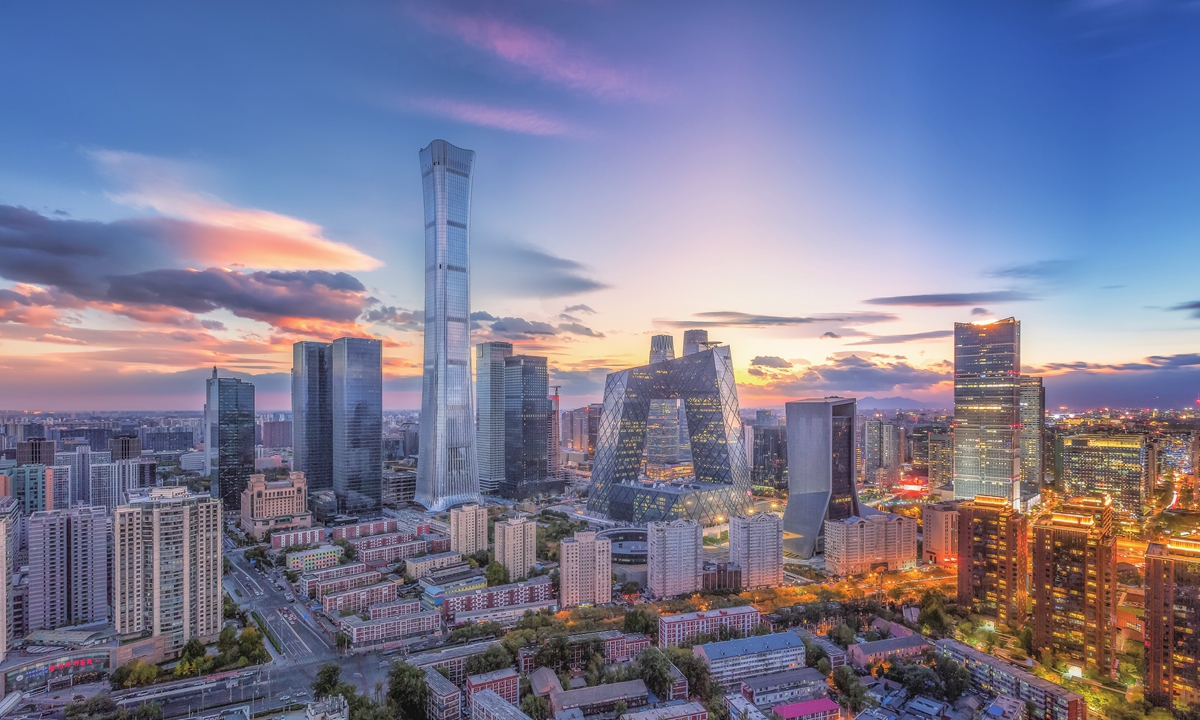
A view of Beijing Photo: VCG
The Atlantic Council and Rhodium Group said in a latest report assessing China's economic development that the country's progress in implementing market reforms has become "stagnated," the South China Morning Post reported on Thursday.
The report, which acknowledged China was still performing well in some measured categories, comes amid the rise of a new wave of Western public opinion talking down the Chinese economy. The IMF on Tuesday lowered its growth estimate for China's economy this year, saying the country's slowdown is one of the three main headwinds facing the global economy.
In a world undergoing profound changes unseen in a century, the Chinese economy is indeed facing great downward pressure. But it needs to be seen that China's sound economic fundamentals, super-large economic volume and long-term development momentum have been a point of resilience to enable the economy to emerge from the global headwinds.
As the only country in the world with a complete industrial system, China's industrial chain is still well integrated and irreplaceable, while China's performance in foreign trade and attracting foreign investment still maintains a solid growth. All these are reflections of the inherent certainty of the Chinese economy. Therefore, China is still the most stable large-scale economy injecting the most certainty into the global economy mired in great uncertainties and predicaments.
It is undeniable that China's economic development is facing uncertainties, which have been closely intertwined with the complicated and fraught changes around the world. Since the beginning of this year, with the outbreak of major geopolitical events unseen in decades, a series of US-led Western moves in the political and economic aspects have further exacerbated the uncertainties.
The consequent global economic chaos and turmoil, including the US' tech restrictions on China, will inevitably have an impact on China's industrial chain, supply chain and economic development. China is well aware of these difficulties and impacts. Therefore, how to ensure the economic and social stability by minimizing the negative shocks is the most urgent task facing the Chinese economy.
Indeed, China is not unprepared for the shockwaves from the outside world. To a certain extent, China's ongoing transformation from an investment- and export-driven economy to a consumption-driven one is one of the responses, which is aimed at pursuing high-quality growth.
It is worth noting that in the process of transformation, the Chinese government proposed a dual-circulation strategy, meaning that the country will not only strengthen the support of external circulation, but also vigorously promote the construction of internal circulation. In essence, the internal circulation is to make consumption a new driving force expected to be equivalent to the role of exports in China's economic growth.
The world economy is expected to face tougher headwinds and may even enter a recession next year. With the grim prospect of a significant contraction in the global market as well as US driven decoupling and containment targeting China, it is more essential than ever for China to maintain overall stability by fully spurring the potential of its domestic market.
Of course, building an economic system that is immune to external shocks is not something that can be done in the short term, and lots of work needs to be done. For example, in April, China unveiled guidelines for accelerating the building of a national unified market, envisioning breaking local protection and market fragmentation and unblocking key sticking points that weigh on internal circulation.
Moreover, China will continue to adhere to the basic national policy of reform and opening-up, and will roll out measures that can be adapted to the new situation. It is believed that once China deepens its reform to the domestic market and the consumption potential of the national unified market is fully stimulated, China's economic growth potential will be further released.
For Western institutions and scholars, without fully understanding the environment and challenges facing China, they will never be able to correctly interpret China's policy intentions and that's how misjudgments were generated in most cases.




